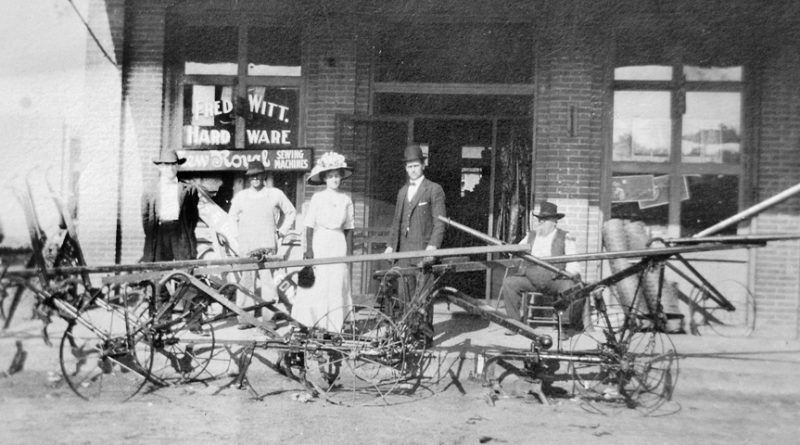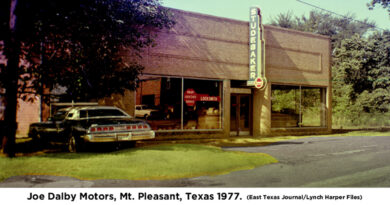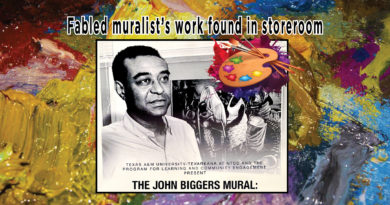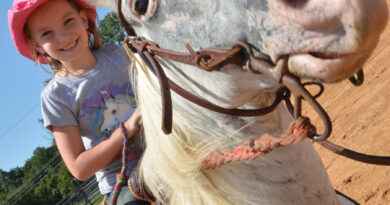Every store in Cookville robbed !
By Sam Ferguson East Texas Journal Production Manager
Cookville Texas was visited by a gang of burglars and “knob knockers” on Saturday night, January 24, 1925.
Every store in the town was broken into. The combination lock was knocked off the Cotton Belt depot where $100 in money and 15 blank money orders were taken.
The money order stamp was stolen from the post office and the mailbox of the Cookville State Bank was rifled, and all the letters torn open.
The safe at Fred Witt’s General Merchandise was plundered and $300 in money and a large amount of dry goods were taken.
G. C. Garrett’s Hardware Store lost a quantity of knives, two pistols, some cartridges and some money.
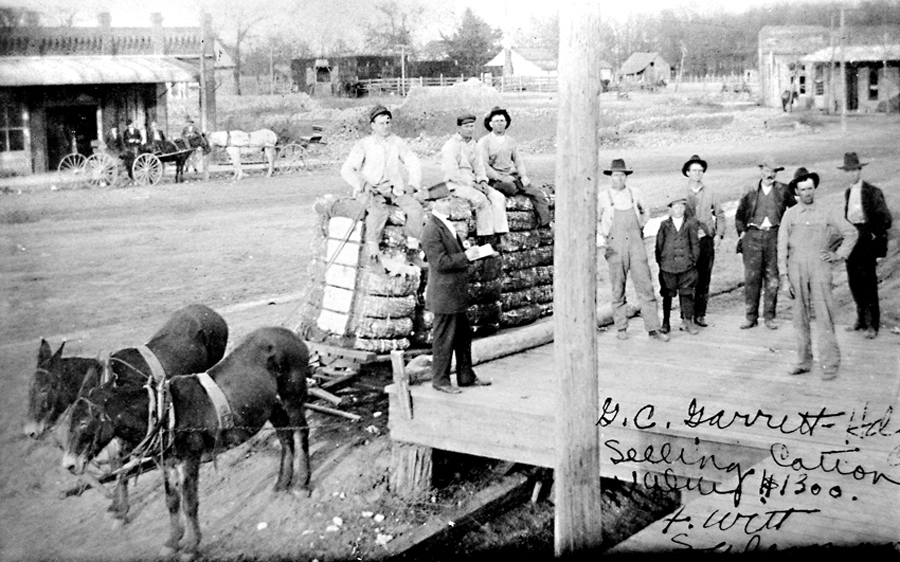
Jewelry, novelty goods and drugs were taken from the Wallace Drug Store.
A. M. Porter & Co. lost a pistol and merchandise.
The burlars also entered the general merchandise store of O. L. Taylor & Co., and took several items from that place.
J. B. Phillips Grocery, the barber shop and a restaurant were burglarized.
The locks of the stores were broken and the doors pried open with the tools from a blacksmith shop in Cookville, said the MP Daily Times on January 26.
Only one life was lost, a cat found dead in one of the stores, said the Cooper Review on February 6.
Local officers spent Sunday investigating, but could find no clues identifying the outlaws.
Mt. Pleasant City Marshal Ben Chapman captured 47-year-old, C. J. Baker shortly after midnight Sunday. Following so soon after the wholesale burglaries at Cookville, there is a possibility that the man was connected with the crimes.
Mr. Chapman had been on the lookout for men he had been notified were wanted by Cass County officials. When C. J. Baker got off the south–bound passenger train in Mt. Pleasant shortly after midnight, and was acting suspiciously, Marshal Chapman watched him closely. After getting off the train Baker slipped between the station and the freight house and went to a restaurant. He soon came out and made his way back to the depot, avoiding the light as much as possible, Marshal Chapman said. Baker went to a rooming house but it was crowded, so he went to another where he rented a room. The town marshal slipped in and told the landlady that he wanted to talk to the man who had just taken the room.
Surprising Baker when he opened the door with a flashlight he discovered the man sitting between the two beds. In one hand he was holding a bottle which proved to be nitroglycerin and in the other a bunch of master keys. The more he questioned him, the more suspicious the lawman became, so he took him to jail. He went back to the man’s room and found a pistol and some other articles.
Baker had one leg bandaged, but when asked if it was sore, said it was not, so the bandage was taken off and $270 in cash was found around his leg. Inside his cap was found more money, and more discovered in other parts of his clothing. Some of the bills looked as if they had been torn by an explosion, and it is thought they were taken when a safe was blown up.
C. J. Baker was an escaped convict wanted in Mississippi where he had confessed to blowing up the Missouri Pacific safe at Charleston, Missouri, and also the Cotton Belt safe at Blytheville, Arkansas Evidently the man was planning to pull off a job in Mt. Pleasant, the MP Daily Times story said.
Earl Deam, Post Office Inspector, G. C. Bentinck of the American Railway Express Co. and C. R. Pilkington, a Cotton Belt special agent of the Texarkana division, went to Wichita Falls for a connection with the Cookville case. Wichita Falls Chief of Police George H. Hodgins had two pistols with matching numbers that were taken from G. C. Garrett’s store in Cookville. Two men by the names of Will R. Boozer and W. W. Long were captured at Wichita Falls, and confessed to participation in the robbery of several stores, the Cotton Belt Depot and the post office at Cookville.
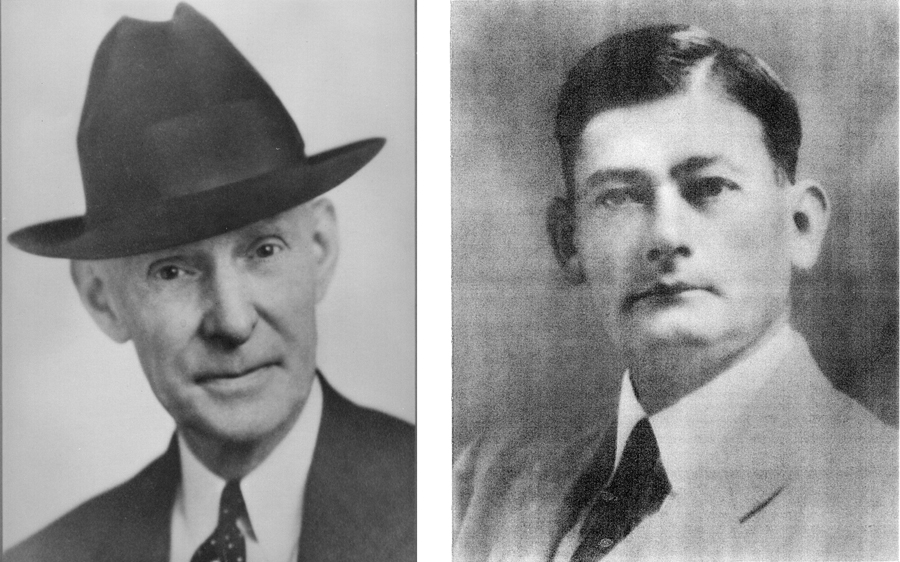
The two men’s first confession said they were touring the country that winter, stopping at small towns along the way and breaking into stores to pay their expenses as they went along. Reaching Cookville they were out of funds and needed a gun, so they proceeded to break into all the stores and help themselves. After the burglaries, they continued to drive north until they reached Duncan, Oklahoma, where their car broke down on them. They abandoned their car there and later stole another, then turned west to Wichita Falls, where they were arrested for vagrancy and also for carrying a gun. The Wichita Falls police had been on the lookout for the car they were driving, and soon traced it to the two men, said the MP Daily Times on February 9.
In a second confession by, Will R. Boozer said he took all the blame, and that he was riding through Cookville on an east-bound freight on the afternoon of January 24, and decided that the town would be a good one to rob, so he dropped off the train about a mile east of town and walked through Cookville, going towards Mt. Pleasant. He returned to Cookville and about 11 o’clock that night he broke into the drug store, where he hoped he would find a flashlight. Failing to do this, he then entered the hardware store and found one.
He said he finished ransacking the town about five the next morning and left Cookville, spending the day in some woods near town before coming to Mt. Pleasant and spending the night in some woods near there. In that patch of woods he burned the money orders taken from the Cotton Belt Depot. He said that he threw an automatic Remington pistol away.
The next morning he started out on foot toward Pittsburg and caught a ride to that town, staying there a while and catching another ride to Quitman and then to Mineola, where he took a train to Dallas, said the MP Daily Times on February 10.
Messrs. Deam, Pilkington and Bentinck, who had been representing the Post Office Department, Cotton Belt and Express Companies, arrived in Mt. Pleasant, February, 12 from Duncan, Oklahoma, where they left W. W. Long and Will R. Boozer, who were placed under indictment for stealing a car and an overcoat. They came to search for some of the articles the men said they had left hidden near Mt. Pleasant.
Along with Q. C. Gaddis, a Mt. Pleasant-based special officer of the Cotton Belt, all went in search for the articles and found two flashlights in a pile of cross-ties along the Cotton Belt south of Mt. Pleasant. A Remington automatic pistol, several boxes of ammunition, 69 pennies and some clothing were found in a hole dug in the woods in back of the Will Spearman place about a mile west of the railroad tracks. It was in this place that the two men had hidden all day.
Will R. Boozer and W. W. Long were brought back to Texas to be indicted by the Federal authorities for tampering with the mails, as some mail was opened at the Cookville Post Office. As the Federal indictment took precedents over State indictments they were first tried before the Federal Court in Texarkana, said the MP Daily Times.
While being held in Stephens Jail in Duncan, Oklahoma on an automobile theft charge, it was discovered that Will R. Boozer, alias James Carleton, had already served three terms in penitentiaries of various states. He was wanted on fourteen cases of robberies that included railroad stations, said the Oklahoma City Times, March 10, 1925.


